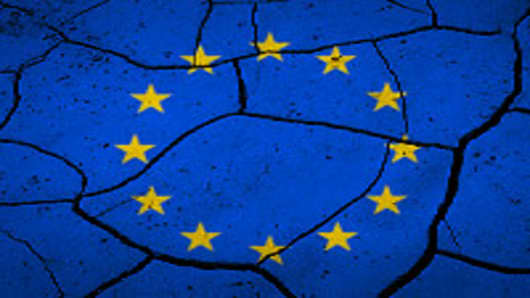The euro slipped from a seven-week high against the dollar Wednesday after a disappointing Spanish bond auction and weak euro zone economic data caused investors to bet the single currency had risen too far, too fast in recent days.
Optimism that Greece will receive more money from its international lenders had buoyed the euro over the past week, but the rally lost steam as worries about Spain resurfaced.
The technical outlook also looked bearish after a break above $1.31, even as the euro's recent gains have pushed it up 1.1 percent year to date. Investors are also reluctant to make big bets on the euro ahead of a policy meeting of the European Central Bank on Thursday.
While the bank is expected to keep its benchmark interest rate on hold at 0.75 percent, investors will be looking for clues to whether ECB President Mario Draghi will show a greater willingness to cut borrowing costs in the future as the euro zone recession deepens.
"The euro is struggling to hold its ground ahead of the European Central Bank interest rate decision amid the negative developments coming out of the region," said David Song, currency analyst at DailyFX in New York. "The single currency may continue to give back the rebound from the previous month as the fundamental outlook for the euro area deteriorates."
Spain auctioned fewer bonds than it hoped to, sending yields sharply higher and reviving talk of an official bailout request from Europe's fourth-largest economy.
A sharp fall in euro zone retail sales for October dented hopes of a consumer-led recovery from recession, which also pressured the euro.
The euro fell 0.1 percent to $1.3075, retreating from a session peak of $1.3126, the highest since Oct. 18. It was the first fall in the euro against the dollar in six trading sessions.
Further chart resistance is located at the October high around $1.3140 and the September high around $1.3170.
Against the yen, the euro rose 0.5 percent to 107.72 yen, having risen to a 7 1/2-month high of 107.95. The euro also hit a 2 1/2 month high against the Swiss franc, though it surrendered gains in New York trading.
The dollar rose 0.6 percent to 82.38 yen. Investors have been expecting a more dovish stance from the Bank of Japan if the main opposition party, as expected, wins a Dec. 16 election.
Shinzo Abe, leader of the main opposition party, has called for the Bank of Japan to embark on "unlimited easing" and set an inflation target at 2 percent. Market talk that Abe would win an outright mandate added to the dollar's allure against the yen.
US Jobs Data Ahead
Camilla Sutton, chief currency strategist at Scotia Capital in Toronto, said she expects a broader range of $1.26 to $1.32 in the euro in the near term. "There is still too much uncertainty to drive euro back to its year-to-date highs (near) $1.35. Accordingly, we would expect the current rally to top out."
On Friday, the U.S. Labor Department is to release non-farm payrolls data for November. U.S. private-sector employers added 118,000 jobs in November, a report by payrolls processor ADP showed Wednesday.
Economists surveyed by Reuters had forecast the ADP National Employment Report would show a gain of 125,000 jobs. A separate report showed the pace of growth in the U.S. services sector increased more than expected in November.
The data had a limited impact on currencies.
Some strategists said the euro could also weaken if signs intensify that U.S. policymakers are struggling to avert the so-called " fiscal cliff ," fueling worries the global economy could suffer, and lifting demand for the safe-haven dollar.
The "fiscal cliff" is the combination of tax hikes and spending cuts due to kick in early next year that could tip the world's biggest economy into recession.
"Nothing is going on" in the talks," House Majority Leader Eric Cantor told reporters following a meeting with fellow Republicans. "We ask the president to sit down with us." Later in the day, however, President Barack Obama said that a deal was possible within about a week if Republicans acknowledged the need to raise taxes on the wealthiest Americans.
The New Zealand dollar was last up 0.5 percent to US$0.8280. New Zealand's central bank held its official cash rate at a record low for a 14th consecutive meeting, pointing to a high local dollar, low inflation, and the threat of price pressures from earthquake rebuilding.


